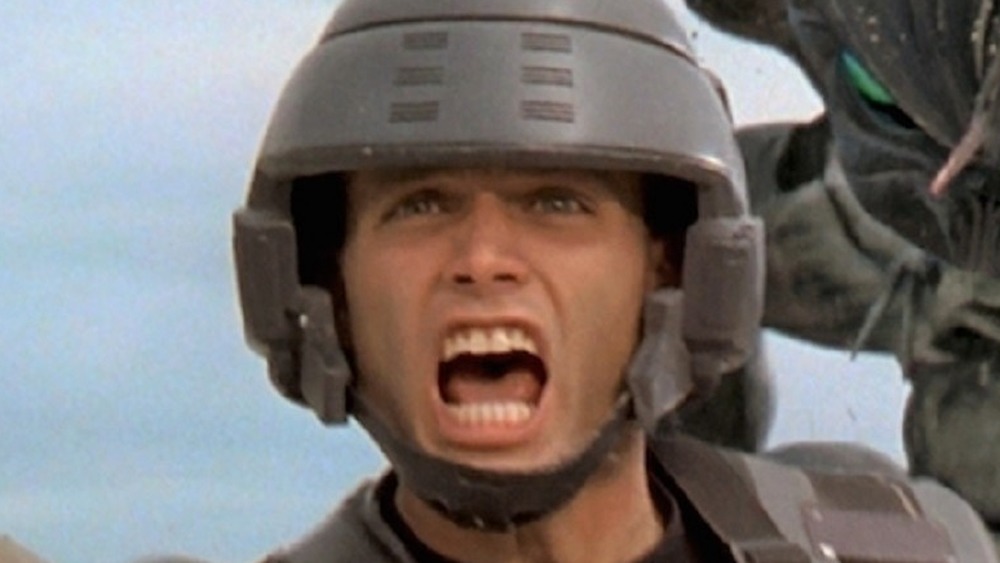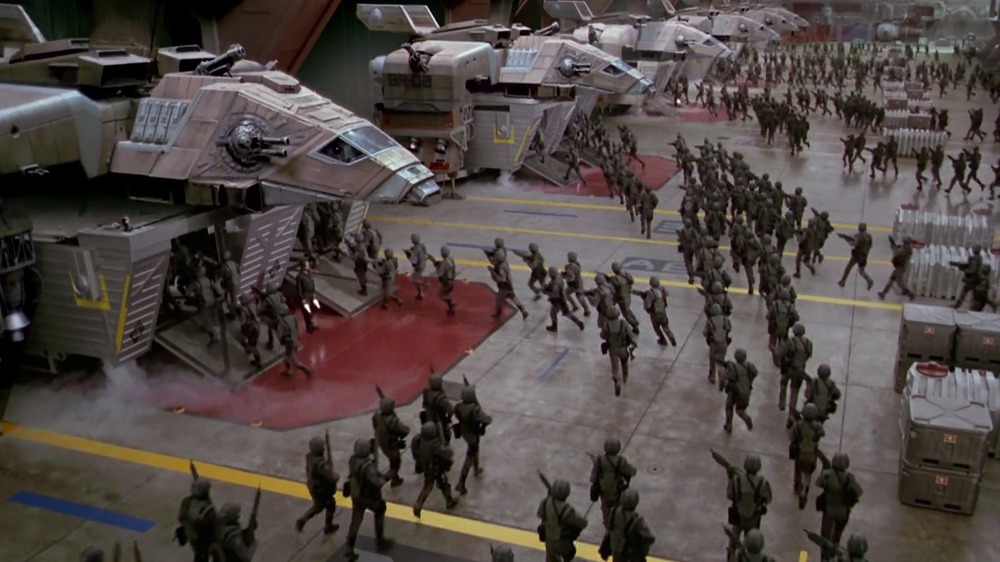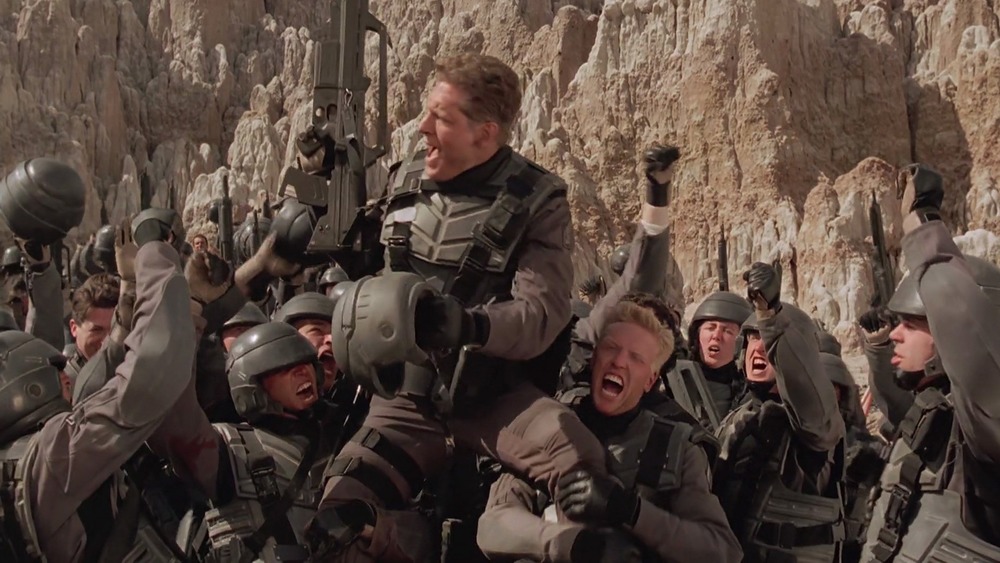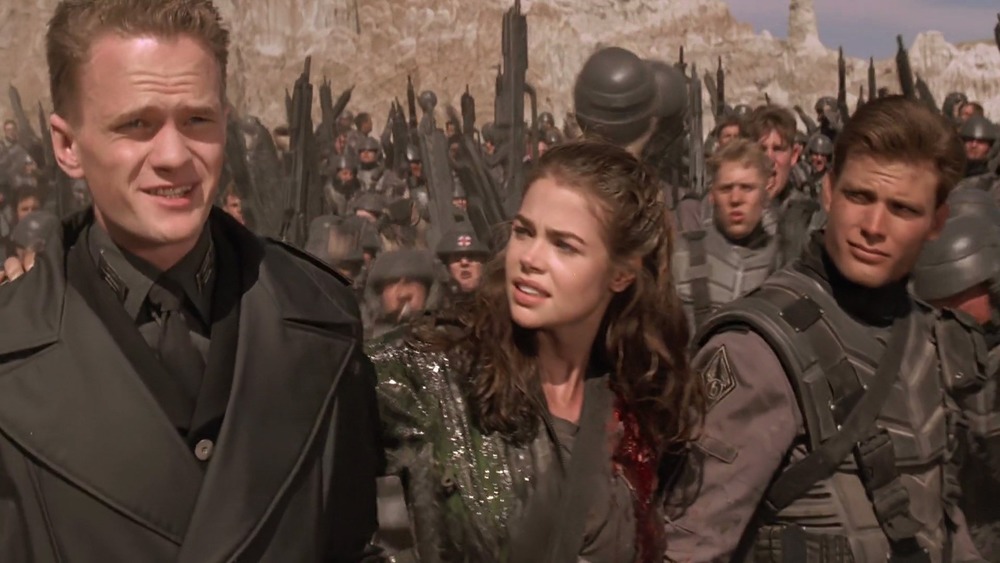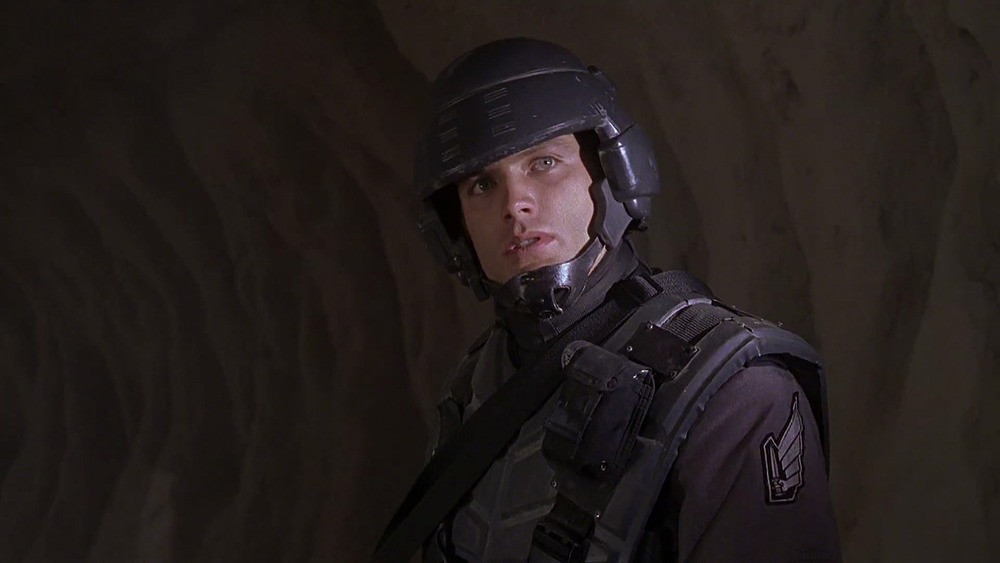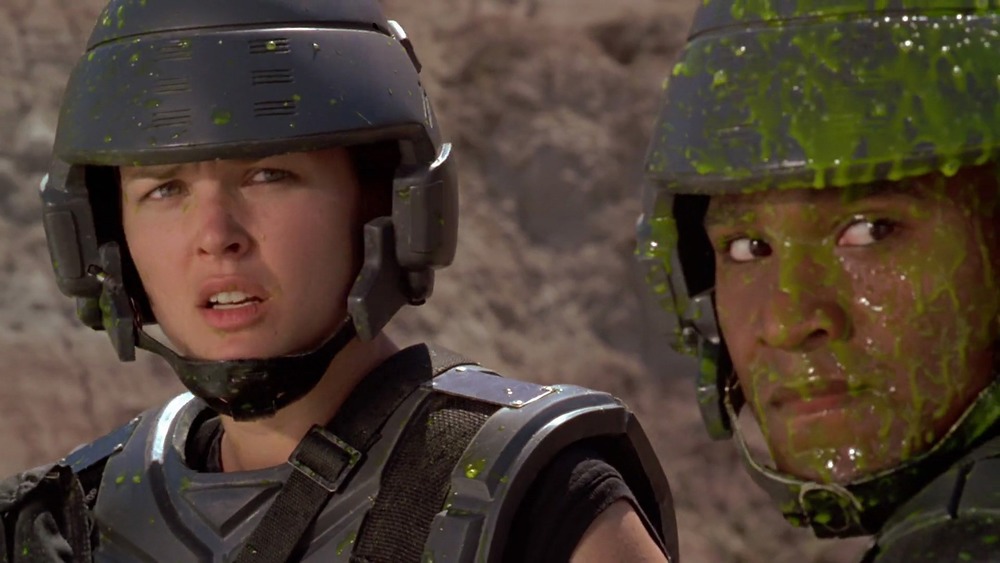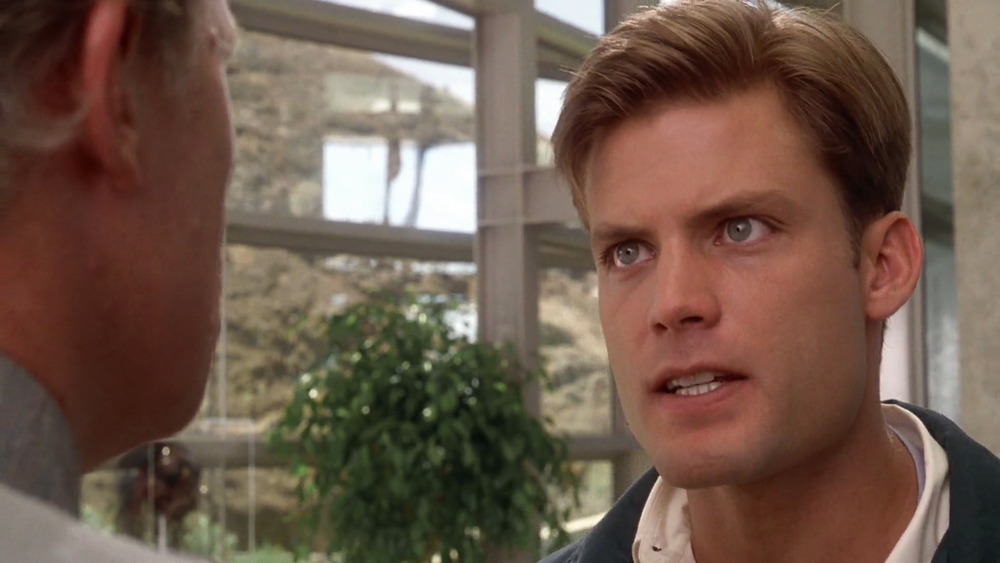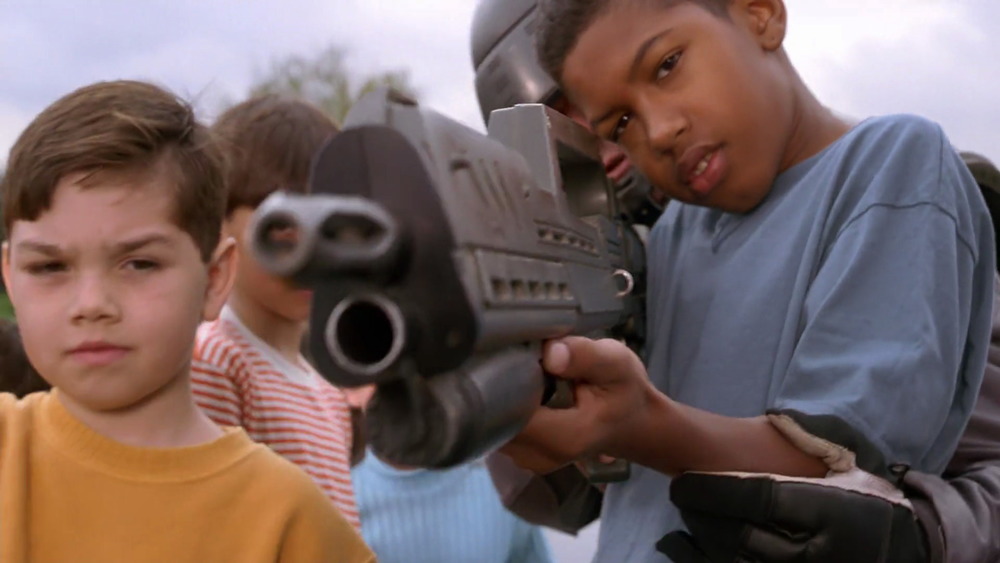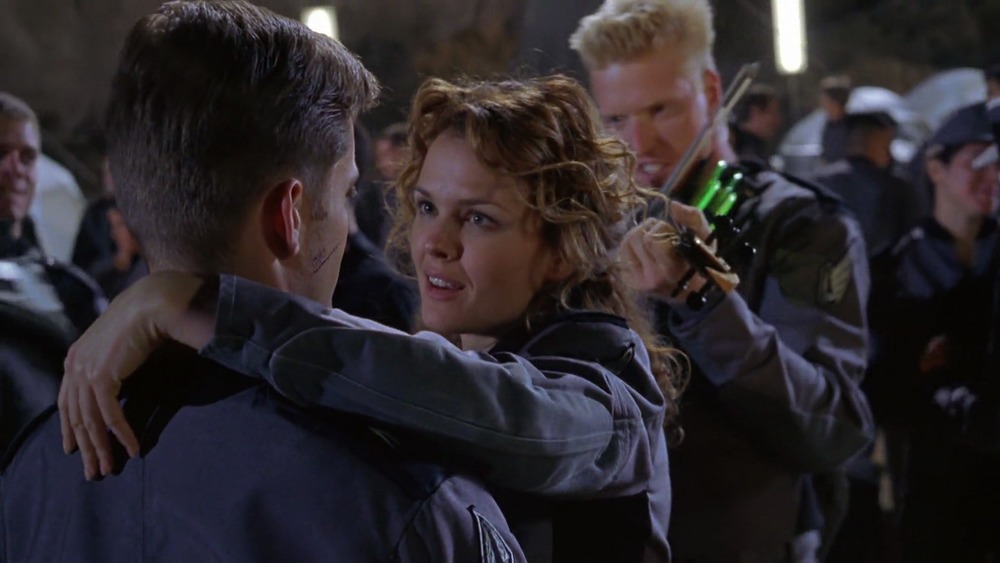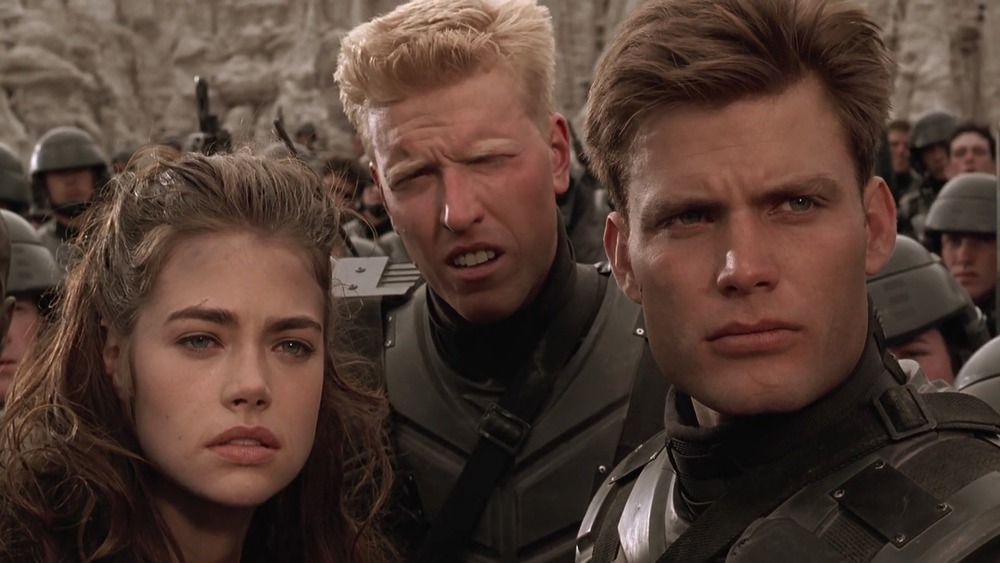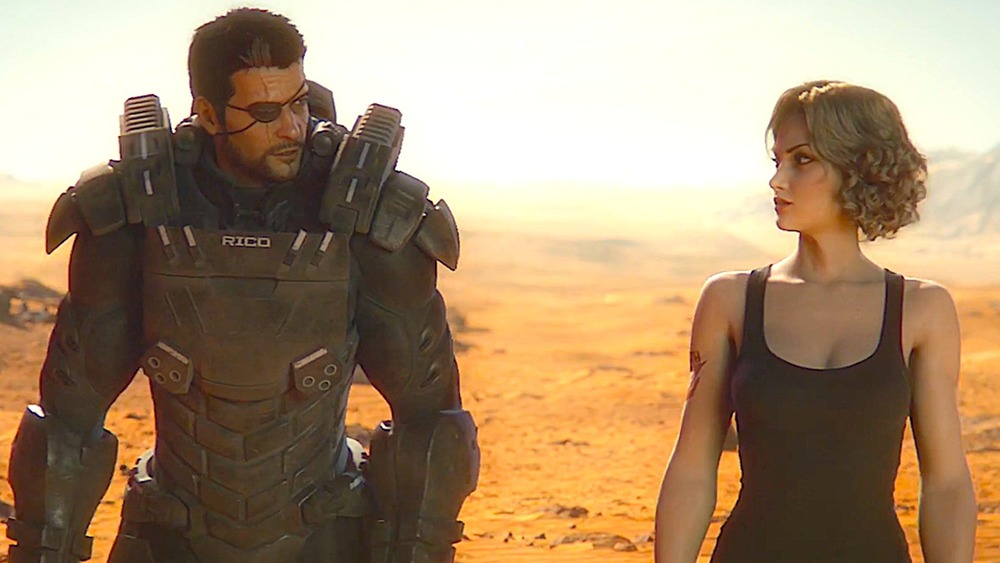The Ending Of Starship Troopers Explained
In 1997, director Paul Verhoeven was at the top of his game. He'd had many certified hits, all dark and captivating in their own unique way, like the explosive Total Recall, the sexy Basic Instinct, and the satirical RoboCop. Something all his films had in common, though, was that they were cheesy in the best way possible, with a palpable silliness that somehow only added to their boundless charm.
Then Verhoeven released his next film – Starship Troopers, a big budget adaptation of Robert Heinlein's novel of the same name. But for some reason, this one didn't hit quite like the others. It barely made its budget back at the box office, and critics just sort of shrugged at it and walked away, labeling it just another forgettable dumb action movie.
But now that we've had a couple decades to reflect, we're pleased to report that there's so much more going on in Starship Troopers than anyone gave it credit for at the time. This film is just as explosive as Total Recall, just as sexy as Basic Instinct, and most shockingly of all, just as satirical as RoboCop. How could we make such a claim? Stick with us and find out. Today, we're dissecting the ending of Starship Troopers, and by the time we're done, we hope you'll agree with us that this dumb movie might in fact be the smartest dumb movie of all time.
(There are major spoilers below.)
Starship Troopers finds a world at war
In the distant future, Earth is ruled by a highly macho and jingoistic government that requires military service as a prerequisite for full citizenship. Despite that, life seems relatively prosperous, apart from a series of ongoing skirmishes with an alien race of seemingly unintelligent giant insects colloquially known as "the bugs."
Our heroes are a group of four recent high school graduates who decide to enlist in the military for various reasons. Carmen Ibanez (Denise Richards), a starry-eyed idealist, has dreams of becoming a pilot. Carl Jenkins (Neil Patrick Harris), an academic prodigy with latent psychic abilities, ends up in military intelligence. Johnny Rico (Casper Van Dien), an aimless jock in search of his identity, impulsively enlists in an effort to impress Carmen, his girlfriend, and ends up in the most dangerous branch of the military — the infantry. Making matters even worse, Dizzy Flores (Dina Meyer), a friend of Johnny's with an unrequited crush on him, tags along and joins his unit.
Then, the bugs launch a direct attack on Earth, destroying our heroes' hometown of Buenos Aires. Humanity responds by launching a direct invasion on the bug homeworld of Klendathu, but this operation ends up being a complete disaster. Around 100,000 soldiers die in the first hour alone, including most of Rico's unit. He and Dizzy are some of the only survivors, and so they get transferred to a new unit, an elite group of soldiers known as the "Roughnecks," led by the stoic Lieutenant Rasczak (Michael Ironside). Soon after, Rico and Dizzy find themselves, along with the rest of the Roughnecks, on their way to answer a distress call on a world only known as Planet P. It's here that the film's final chapter begins.
The battle is won
Once our heroes arrive on Planet P, they discover that the soldiers who sent them the distress signal have all been killed. They find only a lone survivor, a general who tells the Roughnecks that his forces have discovered a formerly unknown leadership caste of bugs, nicknamed "Brain Bugs," that have the ability to absorb knowledge by feasting on the minds of humans.
From there, the base is soon overwhelmed again by bugs, and in the ensuing battle, many Roughnecks are killed, including Lieutenant Rasczak and Dizzy. However, Rico and several other survivors are able to escape, thanks to the intervention of a passing ship that receives their distress call, piloted by Carmen. After taking some time to recover, and holding a funeral for Dizzy, Rico is given command of the Roughnecks, and he's tasked with returning to Planet P and capturing the Brain Bug.
Then, up in orbit, Carmen's ship is suddenly hit by an explosive plasma projectile. She crash-lands on Planet P, but she's quickly captured by bugs and brought before the elusive Brain Bug, who's hungry for the young pilot's tasty gray matter. However, Rico and a couple other Roughnecks arrive at the last minute and save her. Johnny and Carmen retreat to the surface, and moments later, they find that the Brain Bug has been captured by the human forces. Carl arrives on the scene, now a high-ranking military official, and he slowly approaches the captive creature. Using his psychic powers to sense its emotions, he declares, "It's afraid." The surrounding soldiers cheer, and the film ends with a military recruitment video, encouraging the audience to join the fight against the bugs.
What does the future hold at the end of Starship Troopers?
After humanity's victory on Planet P, what's next for our surviving characters? It's probably safe to assume that Johnny, Carmen, and Carl are all locked in to lifetime careers in the military by this point. After the destruction of Buenos Aires, we doubt they'll ever return to the lives they had before. They can't go home again, both in a literal and metaphorical sense. The final recruitment ad gives us a chance to check in on our heroes one last time, and they all appear to be rocketing up the chain of command. Rico has been given permanent command of the Roughnecks. Carmen has achieved her dream of becoming a starship captain. As for Carl, he was already a colonel, and since he was present at the first-ever capture of a Brain Bug, we can only imagine that even more promotions await him in the future.
But now the question that everyone really wants to ask ... are Rico and Carmen going to get back together? They each had their romantic dalliances while apart, Carmen with her crewmate Zander (Patrick Muldoon) and Rico with Dizzy. But now, both of their would-be paramours are deceased. The film as it stands ends with their relationship status uncertain, but there was at one point an alternate ending that settled things far more definitively. In this scrapped version of the finale, Rico and Carmen celebrate their victory on Planet P with a kiss, reaffirming their commitment to their romantic relationship. However, since this scene was ultimately cut, its canonicity is questionable. You'll just have to decide for yourself. When it comes to this couple, do you star-ship it?
How does Rico find Carmen?
When Carmen's ship crash lands on Planet P, she radios Johnny, telling him there are bugs closing in all around her. Then, the connection cuts out. Rico hesitates for a moment before ordering the Roughnecks to ignore her distress call and continue onward. He knows that the bugs don't take prisoners. But a few minutes later, as his troops are making their way through a network of subterranean tunnels, Rico stops in his tracks. He then tells Private Levy (Jake Busey), "She's still alive ... I don't know how I know, but I know." Rico sends the rest of the platoon onward to complete their mission, but he takes two volunteers and attempts a rescue. It turns out that Rico's hunch is correct. Carmen is indeed alive, as the prisoner of the Brain Bug, and he manages to rescue her. Rico's gut feeling ends up saving her life.
But how did Rico do this? We know that psychic powers exist in the world of Starship Troopers, but Rico definitively doesn't have them. In earlier scene, where Carl tests Johnny's psychic aptitude, he concludes that our boy has been gifted with a thoroughly unremarkable brain. The film does actually offer a potential explanation to Rico's lucky hunch in its closing moments, but it's easy to miss. When Rico finally reunites with Carl at the end of the film, a new possibility occurs to him. He says to Carl, "It was you, wasn't it? You told me how to find Carmen." All Carl says in return is, "Well, that's classified." It seems that in the time since he departed the narrative, Carl's psychic powers, much like his military rank, have risen to heights he never would've thought possible.
Nobody learns a lesson in Starship Troopers ... and that's the point
On a basic and literal level, Starship Troopers isn't an especially difficult movie to understand. There's not much ambiguity in the ending, nor are there any last-minute plot twists. But on a deeper level, in terms of its themes, it's a surprisingly tough film to pin down and easy to misinterpret. It is, in one sense, just a movie about soldiers killing bugs, and it presents this story rather plainly, without really telling the audience how to feel about it. Because of this, when the film was first released, it was panned for being violent, joyless, and vacuous. We totally get how this happened.
The film doesn't spell it out for you. There's no big speech at the end where our main character says, "I was wrong, war is bad!" The humans and bugs don't discover that "they aren't so different, after all" and decide to make peace. Honestly, no one really learns anything in the end. That's not to say that the film doesn't have a point that it's trying to make, it actually has several, but these characters and this world are so far gone that there's no saving them. They can't learn the lesson, but we can. Starship Troopers is a cautionary tale, trying to steer us away from the horrible future this film depicts.
Obsession leads to self-delusion, which leads to ruin
One of the topics that Starship Troopers seems interested in exploring is the idea of self-delusion. All throughout the film, single-minded obsession and willful ignorance lead to characters either dying or ruining their lives. Humans believe that the bugs are weak, and that victory on Klendathu is assured, but then the bugs slaughter them mercilessly, and they're forced to retreat. Humans think that the bugs are all unintelligent, but at the end of the film, they discover a subspecies of intelligent Brain Bugs that direct the movements of the frontline soldiers. Time and again, the conventional wisdom that humans espouse ends up being completely wrong.
But this theme isn't just explored on a cosmic scale, it's also reflected on a personal scale, in the lives of our protagonists. Rico's all-consuming love for Carmen makes him enlist in the infantry, which forces him to endure a gauntlet of life-threatening horrors. Similarly, Dizzy Flores' obsession with Rico leads her to enlist and request a transfer to his unit, which ultimately leads to her death. Starship Troopers shows us again and again that many of the horrible things that happen to us are things that we do to ourselves out of pride, because we refuse to accept the impossibility of our goals, and we don't know how to move on from failing to achieve them.
Starship Troopers is a warning about fascism
One of the central goals of Starship Troopers, on a thematic level, is a critique of fascism. Fascism is a somewhat loose concept, describing a range of different political movements united by how they gain and maintain control. In his 1995 essay "Ur-fascism," philosopher Umberto Eco lists 14 qualities of fascism. He states that not all fascist movements have all of these qualities, but most have most of them. As you might imagine, pretty much all of the tendencies that Eco outlines are exhibited by the society in Starship Troopers.
These qualities include strict adherence to tradition, rejection of arts and the humanities, love of action for action's sake, fear of difference, a need to exist in a state of perpetual warfare, a culture of death, intolerance of weakness, machismo, "newspeak," and a paradoxical tendency to characterize their enemies as both "a horrible threat that will destroy us all" and "no match for our superior military might." Speaking more on this last tenet, Eco states that, "Fascist governments are condemned to lose wars because they are constitutionally incapable of objectively evaluating the force of the enemy."
You may notice that many of the tenets of fascism seemingly contradict one another or are themselves self-contradictory, and you're correct. Fascism is, at its core, anti-intellectual, as exemplified by characters in Starship Troopers like Johnny Rico, Carmen, and ... well ... pretty much everybody. At the end of the day, fascism isn't really a belief structure. It's a list of talking points used by leaders to seize and maintain control. And as Starship Troopers shows, it's a system that definitely deserves ridicule.
It's an incredibly nihilistic movie
Perhaps a major reason why critics initially labeled Starship Troopers as feeling brainless and soulless is because of how often our heroes have to face horrifically grim tragedies with no warning and with seemingly no deeper meaning. Buenos Aires is destroyed by a meteor, killing Rico's parents. During a training exercise, a perfectly nice farm boy gets accidentally shot in the head. And the woman who accidentally shoots him, a kind person with dreams of becoming a politician, has her entire career destroyed in an instant. Is the film just doing this for cheap shock value? What are we supposed to make of all this senseless suffering?
There's an argument to be made that Starship Troopers is a work of existential nihilism. In the seminal 1946 essay "Existentialism Is a Humanism," Jean-Paul Sartre posits that we live in a world without a god, where everything comes into existence devoid of intrinsic meaning, and meaning only comes to something when we ascribe it. Stuff just happens, and it doesn't mean anything. Meaning only occurs on the small scale, where we will it to be based on the actions we take.
This is actually a fairly common theme in war movies — the idea that war, and by extension life, is meaningless. It's random, messy, and wildly unsatisfying. Happiness or a sense of purpose only occurs in glimmers, such as executing the perfect play to win the high school football game, dancing with your squadmates as a soldier plays the violin, or spending the night with your sweetheart before a big battle. When everything seems meaningless, hold onto your friends and enjoy what time you have with them because that's all you have in the end.
Starship Troopers is lightyears away from the original book
Despite being ostensibly an adaptation of Robert Heinlein's novel, rarely has there ever been an adaptation that's as much of a departure from the source material as this film. The book and the film versions of Starship Troopers share many of the same character names and plot beats, but they're wildly different in terms of their priorities and their deeper messages.
The first major difference between these two is in what they tend to focus on. The book spends most of its time inside of Johnny Rico's head as he muses about life while at boot camp. The movie, however, is more of an ensemble piece, and it focuses more on the war itself. Additionally, the soldiers in the novel are described as being outfitted with powered armor exoskeletons. We're guessing trying to replicate this technology onscreen may have been a bit advanced for a film to handle back in 1997, but we've since seen these sorts of devices brought to life in films like Edge of Tomorrow and District 9.
The other major difference between them is on a thematic level. Unlike the film, the original book isn't especially critical of the fascist future it presents, and it can even be read as pro-fascism. Verhoeven, understandably, wasn't a fan of this at all. In an interview with Empire, he said, "It is really quite a bad book." He then went on to say about his cinematic adaptation, "All the way through we were fighting with the fascism, the ultra-militarism. All the way through I wanted the audience to be asking, 'Are these people crazy?'"
The war continues after Starship Trooper's ending
If you can't get enough Starship Troopers, then we have some good news and some bad news. The good news is that the end of this film isn't the end of the story, as there are numerous direct-to-video sequels. The bad news, they're largely not that great.
The first two sequels are direct-to-video live-action films. Starship Troopers 2: Heroes of the Federation is pretty much universally disliked. It doesn't feature any returning characters, and it doesn't have any of the satiric self-awareness of the original film, instead offering only mediocre horror and bleh sci-fi action. Starship Troopers 3: Marauder, however, is more of a return to form. Not only because Casper Van Dien returns to reprise his role as Johnny Rico but because the filmmakers once again achieve a satiric tone more in line with the first installment. It's a bit of a step down in quality from the first movie in pretty much all respects, but it's still totally worth a watch for diehard fans.
After the third movie, the franchise switched over to the world of animation. Starship Troopers: Invasion wasn't especially loved by critics, and it was compared unfavorably in numerous reviews to a bad video game cutscene. And finally, Starship Troopers: Traitor of Mars received some lukewarm praise for being a campy fun time, but it still paled in comparison to the original film. On the plus side, not only does Casper Van Dien return to voice Rico in Traitor of Mars, but this time, Dina Meyer also returns to provide the voice for Dizzy. If you like delicious sci-fi trash as much as we do, consider checking this one out.
